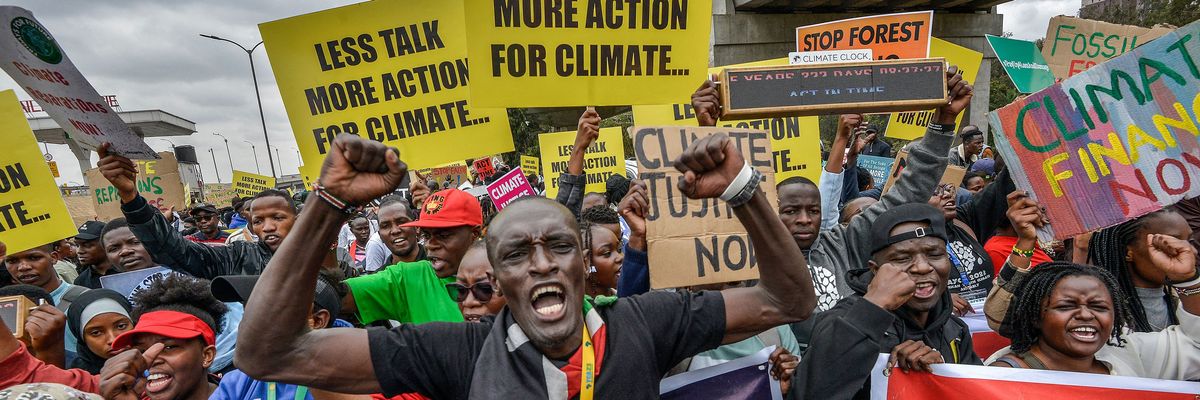As the first-ever Africa Climate Summit kicked off in Nairobi, Kenya on Monday, an analysis by the humanitarian group Oxfam found that rich nations have delivered just a small fraction of the aid that East African nations say they need each year to meet their climate goals.
Unlike rich countries that account for a disproportionate share of planet-warming greenhouse gas pollution, East Africa has contributed "almost nothing" to global carbon emissions that are driving record-shattering heat worldwide, Oxfam's new report notes. In 2021, according to one recent estimate, the average North American emitted 11 times more carbon dioxide than the average African.
The World Meteorological Organization pointed out Monday that Africa is responsible for less than 10% of global carbon emissions.
Yet "East Africa is one of the world's worst-hit regions by climate change and is now experiencing its worst climate-induced extreme weather, fueling an alarming hunger crisis," Oxfam's report states. "Over 31.5 million people are currently facing acute hunger across Ethiopia, Kenya, Somalia, and South Sudan."
Those countries, which suffer billions of dollars worth of climate-related damage each year, have said they will need at least $53.3 billion annually to meet critical targets under the Paris Climate Agreement. According to Oxfam, wealthy countries provided just $2.4 billion in aid to East African nations in 2021.
More broadly, Oxfam noted, high-income countries pledged that they would provide $100 billion a year by 2020 to help lower-income countries fight climate chaos.
"Oxfam estimates that in 2020 the real value of financial support specifically aimed at climate action was only around $21 billion to $24.5 billion—much less than officially reported figures suggest," the group's report states.
Fati N'Zi-Hassane, Oxfam's Africa director, said Monday that "even by their own generous accounts, polluting nations have delivered only pittance to help East Africa scale up their mitigation and adaptation efforts."
"Nearly half the funds (45%) they did give were loans, plunging the region further into more debt," N'Zi-Hassane added.
Climate finance is expected to be a major topic of discussion at the Nairobi summit, which comes after months of scorching heat on the continent.
"Africa is seen as a sunny and hot continent," Amadou Thierno Gaye, a research scientist and professor at Cheikh Anta Diop University in Dakar, told Bloomberg in July. "People think we are used to heat, but we are having high temperatures for a longer duration. Nobody is used to this."
The Associated Pressreported Monday that "there is some frustration on the continent about being asked to develop in cleaner ways than the world's richest countries—which have long produced most of the emissions that endanger climate—and to do it while much of the support that has been pledged hasn't appeared."
Mohamed Adow of Power Shift Africa told AP that "we have an abundance of clean, renewable energy and it's vital that we use this to power our future prosperity. But to unlock it, Africa needs funding from countries that have got rich off our suffering."
In addition to calling on rich nations to contribute the aid they've promised to support Africa's renewable energy transition, African civil society groups are urging their leaders to reject fossil fuel expansion, specifically warning against the completion of TotalEnergies' East African Crude Oil Pipeline (EACOP).
A recent Human Rights Watch report warned that more than 100,000 people in Uganda and Tanzania are set to "permanently lose land to make way for the pipeline and Tilenga oilfield development." One analysis indicates the pipeline could result in 379 million tonnes of planet-warming emissions over its lifespan—more than 25 times the combined annual emissions of Uganda and Tanzania.
Zaki Mamdoo, coordinator of the Stop EACOP Coalition, said Monday that "the African Climate Summit could provide the platform needed for the continent to dramatically shift its trajectory and future—from one that is set to bear the brunt of climate collapse, to one of energy security and prosperity driven by decentralized and people-centered renewables."
"For this to happen," said Mamdoo, "African leaders will need to rise to the occasion and make firm commitments to significantly upscale renewable energy developments while resisting and withdrawing any and all support for exploitative and destructive projects like the East African Crude Oil Pipeline."

